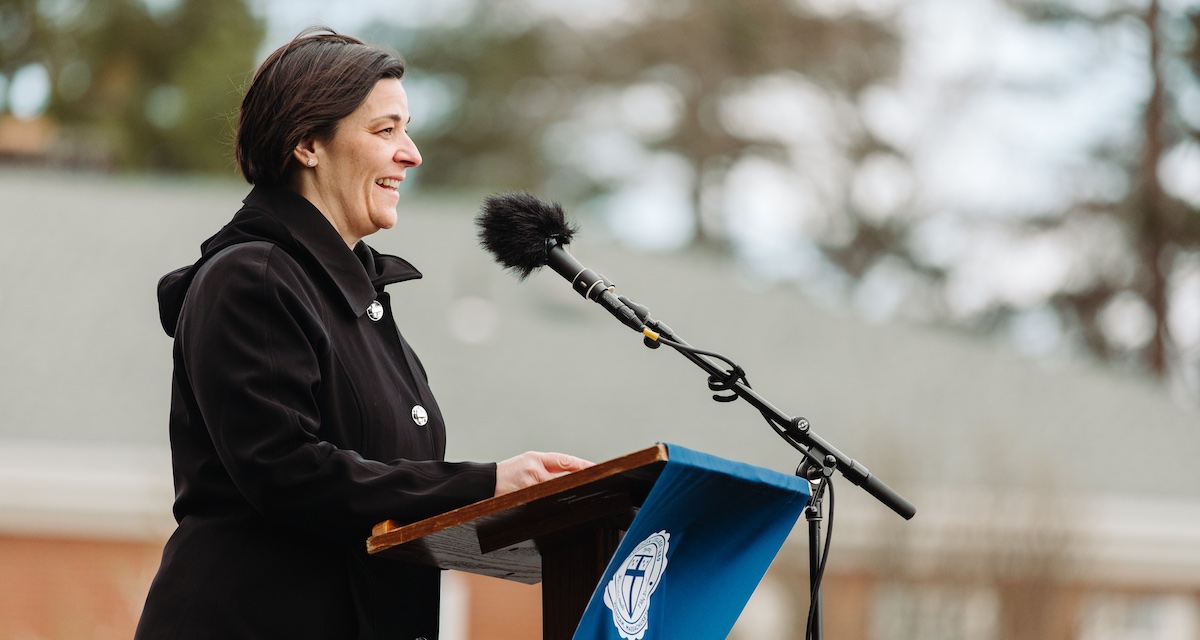Sharon Galgay Ketcham Awarded $75k Grant for Spiritual Formation Initiative
Am I Christian enough?
It’s a question that Dr. Sharon Galgay Ketcham, professor of theology and Christian ministries, thinks too many Christians may be asking themselves, and one she seeks to upend with a new faith integration and spiritual formation initiative funded by a recent $75k grant from the Cecil B. Day Foundation as part of the College’s strategic plan.
At the root of this question, Ketcham says, is a perceived set of expectations that drive whether we feel accepted and whether we determine others to be acceptable. In place of these “social measuring sticks,” Ketcham suggests a framework with three different aspects of faith from which a Christian community can carry out a different, healthier assessment. The goal: exchange judgment for encouragement, and spur one another on to a richer, thriving faith.
At Gordon’s annual Matriculation Chapel, Ketcham outlined the three aspects of faith that reflect different dimensions of the human experience: cognitive (“faith as believing”), affective (“faith as trusting”) and behavioral (“faith as acting”). All three aspects are present in faith, though in various Christian traditions or social contexts, one is often emphasized more than the others.
1. “Faith as believing” focuses on ideas and words that give shape and coherence to understanding God and God’s purposes in the world. These are the tangible objects of faith in a belief system; the “what.” Christian communities nurture believing faith through holding a statement of faith, conducting Bible studies or CCD classes or reciting the Nicene Creed. “If your ‘believing faith’ needs to be encouraged,” Ketcham says, “hang out with someone who is nondenominational and loves to study Scripture or ask a Presbyterian to show you their book of confessions.”
2. “Faith as trusting” is marked by confident reliance on a God who is faithful and dependance upon God’s presence in everyday life. We practice trusting faith when we reflect on God’s past faithfulness and feel confident in God amid uncertainty—just as David did when facing Goliath, Peter when exiting the boat to walk on water and Mary when receiving the news that she would give birth to the Savior. “If your ‘trusting faith’ needs to be encouraged,” Ketcham says, “listen to a Pentecostal who knows about having confidence in the Spirit or have a conversation with an Episcopal, Anglican or Orthodox believer who trusts God’s presence in liturgy.”
3. “Faith as doing” informs a way of life—mirroring God’s faithfulness—through personal transformation and taking action to love our neighbor in pursuit of shalom. This is embodied through generosity, compassion, acts of service and justice. “If your ‘doing faith’ needs to be encouraged,” Ketcham says, “talk to a Catholic about carrying out acts of charity and justice or a Baptist who desires a transformed life to give witness of Christ.”
In a community of more than 40 Christian faith traditions like Gordon, there is rich opportunity to learn from and encourage one another in these three aspects of faith. When we see beauty and opportunity in the differences, Ketcham says, we will spend less time in judgment and more time attending, as Christ-centered people, to the pressing issues all around us: creation care; political, social, ethnic, racial, and family divisions; lack of food, shelter, and safety for vulnerable individuals.
To see this new framework lived in the Gordon campus community, Ketcham is spearheading a steering committee and working group to enrich spiritual formation as part of the College’s strategic plan. The grant funding will launch a three-year plan that includes training development, a Chapel internship program and infrastructure construction that leverages residence life, academic and co-curricular experiences to create holistic faith integration.
By tending to—and encouraging others in—the cognitive, affective and behavioral aspects of faith, students develop a more vibrant spiritual life, which Ketcham believes will result in a proclamation of the Gospel in New England and beyond.
Watch Ketcham’s Matriculation Chapel address :
 The Bell
The Bell